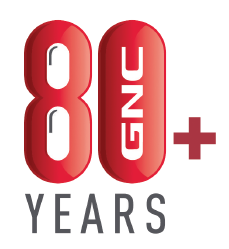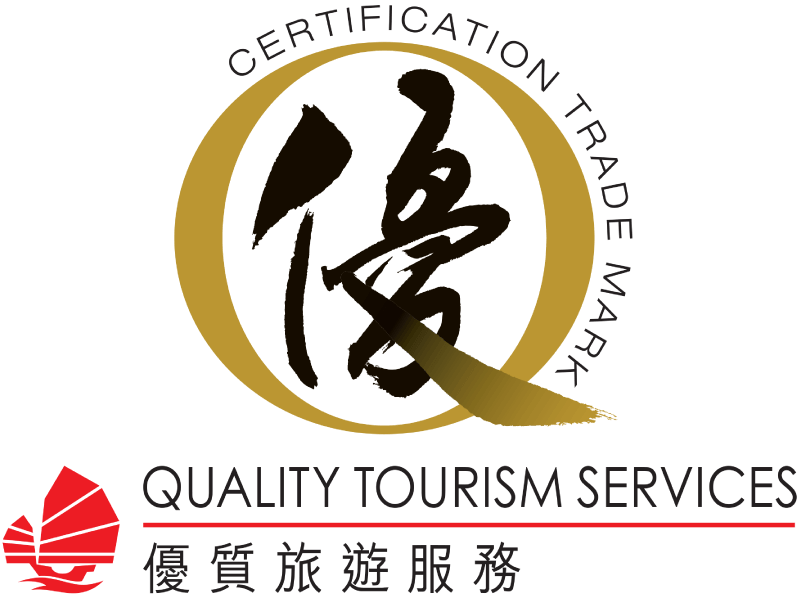Health Tips, Heart & Brain
Cardiovascular problems are considered urban killers. Cardiovascular health cannot be ignored. Coenzyme Q10 helps with antioxidant function and maintains myocardial contractility.
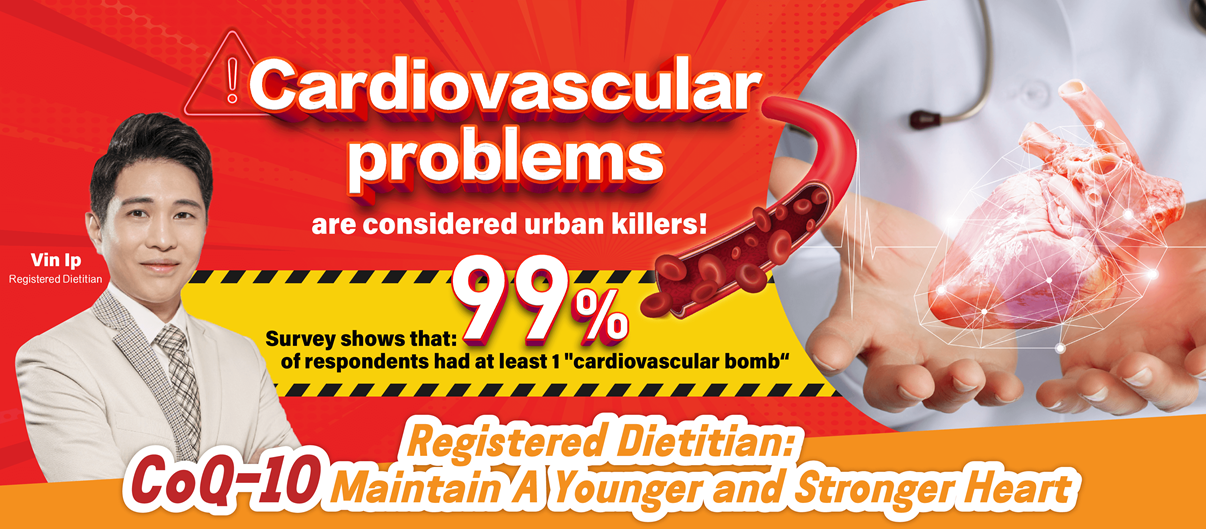 As a modern city, life in Hong Kong is fast-paced with high work pressure and poor lifestyle habits. This increases health risks, with many issues showing a trend towards affecting younger populations. Heart health has become a hot topic in recent years. According to data from the Department of Health in 2023, cardiovascular problems rank third among the most common fatal problems in Hong Kong. About 13% of deaths in 2020 were attributed to cardiovascular issues, and the risk increases with age. A survey conducted by the Hong Kong College of Cardiology in 2021, in collaboration with the Chinese University of Hong Kong, found that almost all respondents (99%) had at least one “cardiovascular bomb” (a high-risk factor for cardiovascular health problems). Protecting the heart involves paying attention to daily life and supplementing with substances beneficial to the heart to maintain cardiac function.
As a modern city, life in Hong Kong is fast-paced with high work pressure and poor lifestyle habits. This increases health risks, with many issues showing a trend towards affecting younger populations. Heart health has become a hot topic in recent years. According to data from the Department of Health in 2023, cardiovascular problems rank third among the most common fatal problems in Hong Kong. About 13% of deaths in 2020 were attributed to cardiovascular issues, and the risk increases with age. A survey conducted by the Hong Kong College of Cardiology in 2021, in collaboration with the Chinese University of Hong Kong, found that almost all respondents (99%) had at least one “cardiovascular bomb” (a high-risk factor for cardiovascular health problems). Protecting the heart involves paying attention to daily life and supplementing with substances beneficial to the heart to maintain cardiac function.
Common “Heart-harming” Habits Prevalent Among Hong Kongers are Potential Risks
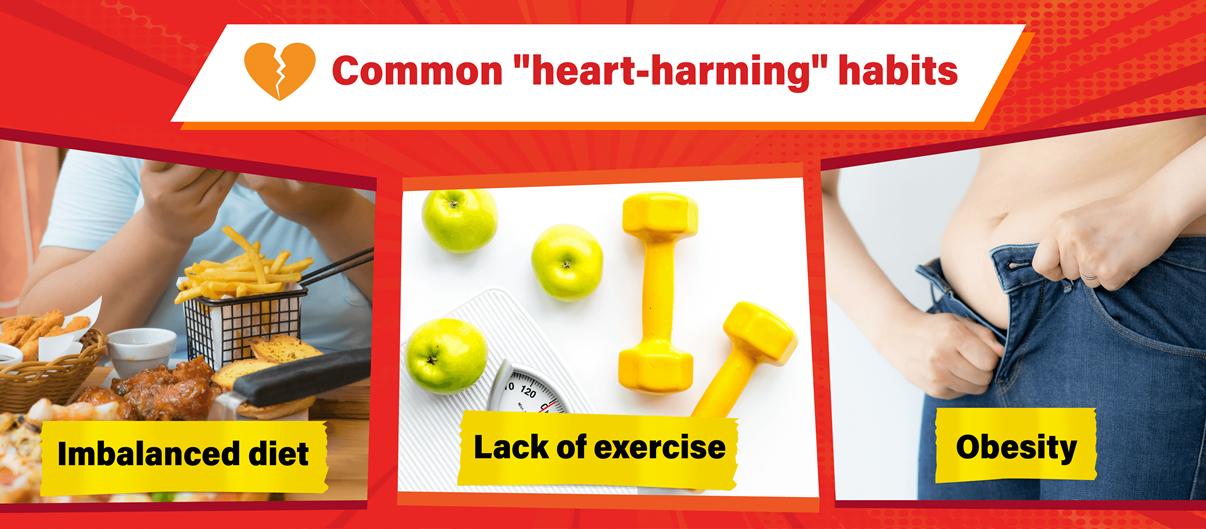 Little did we know, everyday “heart-harming” habits may have already been unconsciously established. Common cardiovascular problems among Hong Kongers can stem from various risk factors, the most common being:
Little did we know, everyday “heart-harming” habits may have already been unconsciously established. Common cardiovascular problems among Hong Kongers can stem from various risk factors, the most common being:
- Imbalanced diet: Many Hong Kong foods such as dim sum, street snacks, hotpot, and double-cooked meals contain hidden amounts of fats. Excessive intake of high-fat, high-salt, and high-sugar foods, coupled with a lack of fresh fruits, vegetables, or whole grains in every meal, may increase cardiovascular risks.
- Lack of exercise: This is a common issue among office workers. Prolonged periods of sitting still and a lack of aerobic exercise may lead to a decrease in metabolism, increasing the risk of cardiovascular problems.
- Obesity: Although cardiovascular problems are not necessarily related to body size, being overweight, obese, and chronic conditions such as hypertension, hyperlipidemia, and diabetes can significantly increase the burden on the cardiovascular system.
Therefore, it’s crucial for everyone to pay attention to cardiovascular health and protect their hearts!
Signs and Symptoms of Cardiovascular Problems You Should Know
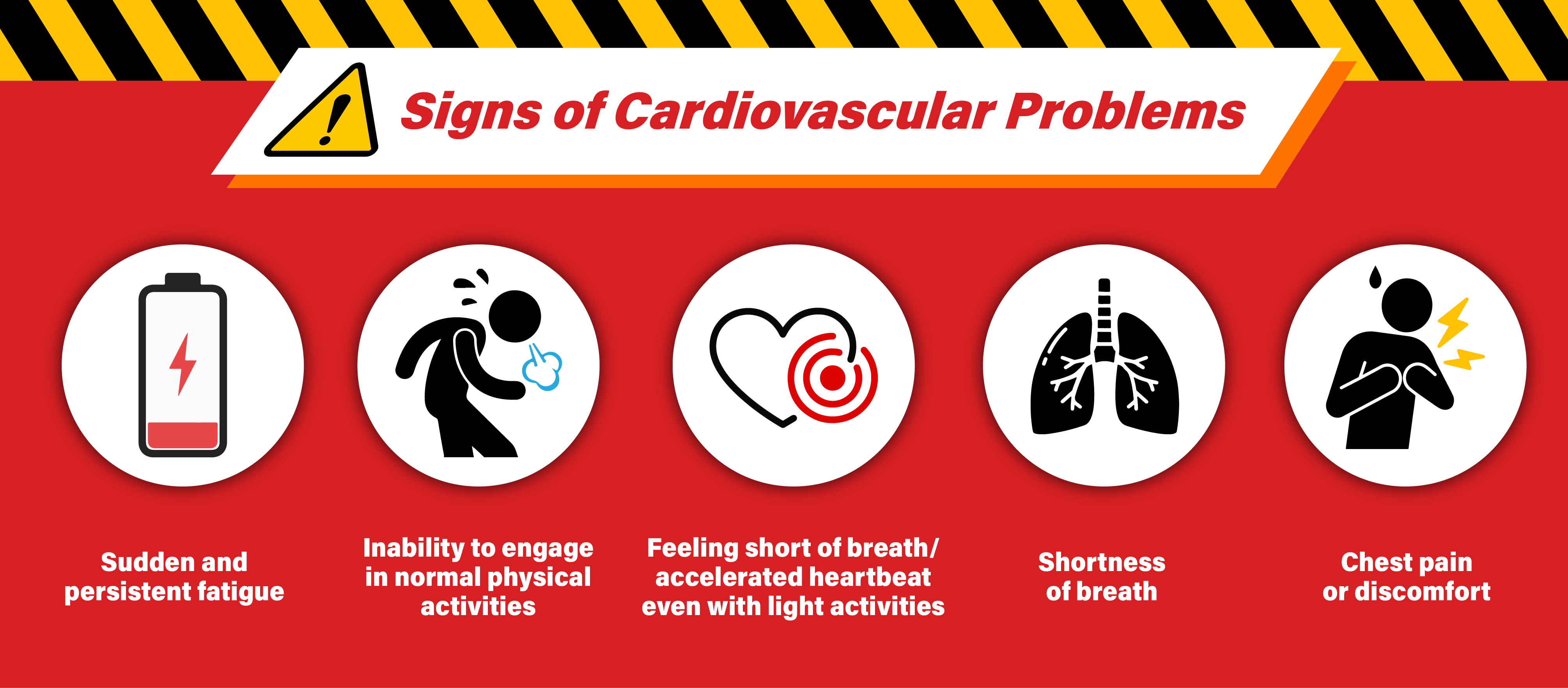
When cardiovascular problems arise, there may be some warning signs to watch out for. If you experience the following symptoms, you should take note:
- Sudden and persistent fatigue.
- Inability to engage in normal physical activities as usual.
- Shortness of breath.
- Feeling short of breath or experiencing difficulty breathing even with light activities, or feeling an accelerated or irregular heartbeat.
- Chest pain or discomfort, which may even radiate to the arms, neck, or back.
If these symptoms persist or worsen, you should seek medical attention promptly. It’s also important to prioritize cardiovascular health and condition on a regular basis to effectively manage health risks!
Protecting the Heart: Key Strategies for Maintaining Vascular Flexibility and Myocardial Contractility
To effectively protect the heart, it’s important to understand that it’s not just about safeguarding the heart itself. Maintaining vascular flexibility and myocardial contractility are equally crucial. Vascular flexibility refers to the elasticity of blood vessel walls, allowing them to stretch and recoil. Normal blood vessels should possess a certain level of elasticity to adapt to various physiological and environmental changes, such as heart contractions and relaxations, fluctuations in blood flow, etc. Preserving vascular elasticity helps prevent blood vessel blockages and the accumulation of plaque, thereby reducing the risk of cardiovascular problems.
Additionally, the strength of the heart is of utmost importance. Myocardial contractility is often overlooked but plays a vital role. The myocardium, the main component of the heart muscle, is responsible for pumping blood to supply the body’s tissues and organs. The ability of the heart muscle to contract and relax directly impacts the heart’s pumping function.
During the cardiac cycle, a healthy heart’s myocardium contracts to push blood from the heart’s ventricles into the arteries and the systemic circulation system. As the pressure increases within the ventricles, blood is propelled into the aorta and pulmonary artery, supplying oxygen and nutrients to the entire body while simultaneously removing metabolic waste and carbon dioxide. The stronger the contractility of the myocardium, the more efficient the heart pumps blood. If myocardial contractility weakens or is impaired, the heart may struggle to pump blood effectively, leading to various cardiovascular crises such as cardiac weakness or failure.
Engaging in moderate aerobic exercise and consuming a heart-healthy diet can enhance myocardial contractility, thereby improving cardiac function and reducing cardiovascular risks. Coenzyme Q10 (Q10) plays a crucial role in empowering the heart.
What is Q10?
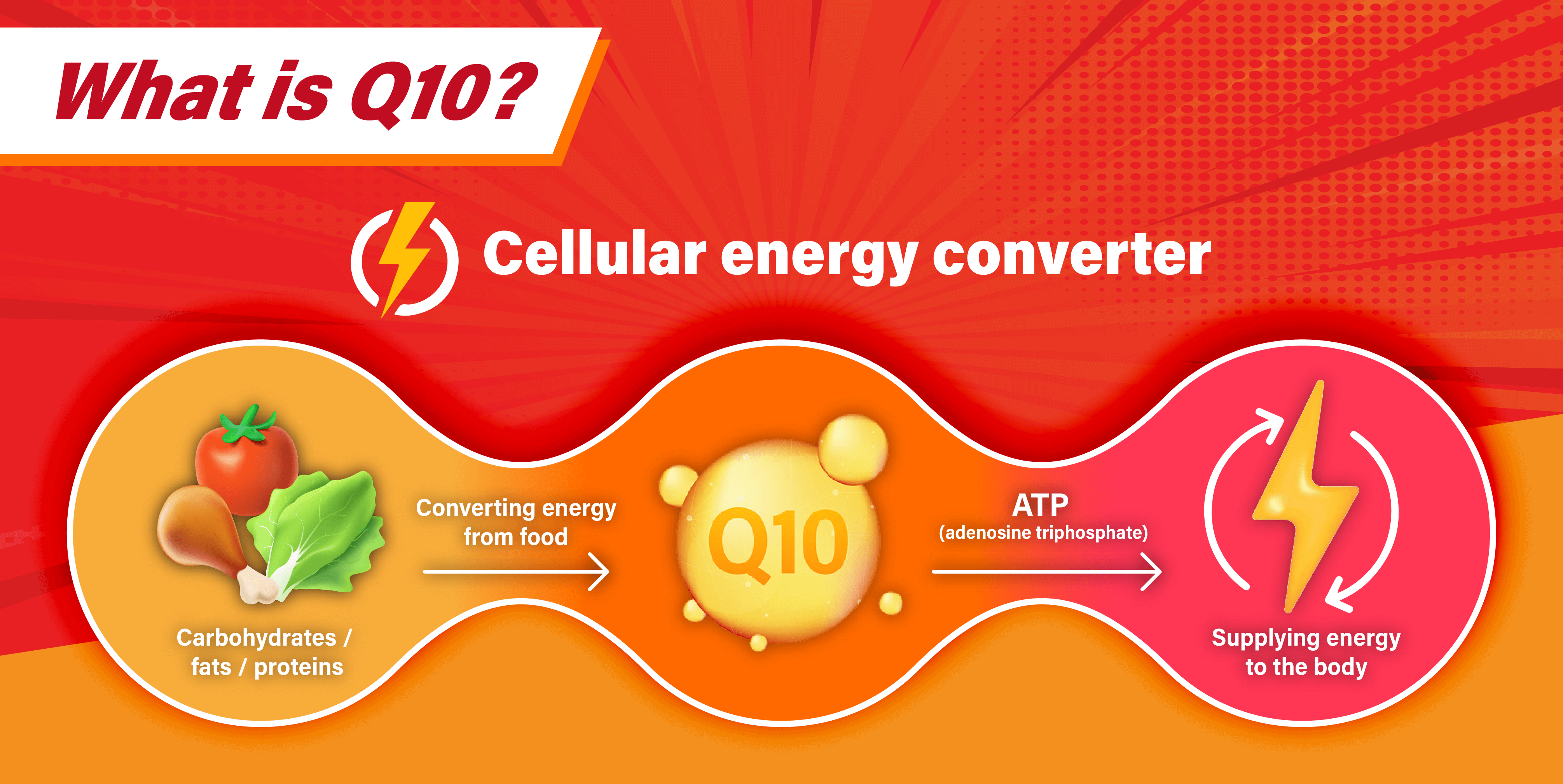 Coenzyme Q10, often referred to as Q10, is a naturally occurring compound found in the cells of the human body. It plays a crucial role in converting energy from food into ATP (adenosine triphosphate), which is the energy currency of the body. This process is essential for supplying energy to the body and is particularly important for cellular energy production.
Coenzyme Q10, often referred to as Q10, is a naturally occurring compound found in the cells of the human body. It plays a crucial role in converting energy from food into ATP (adenosine triphosphate), which is the energy currency of the body. This process is essential for supplying energy to the body and is particularly important for cellular energy production.
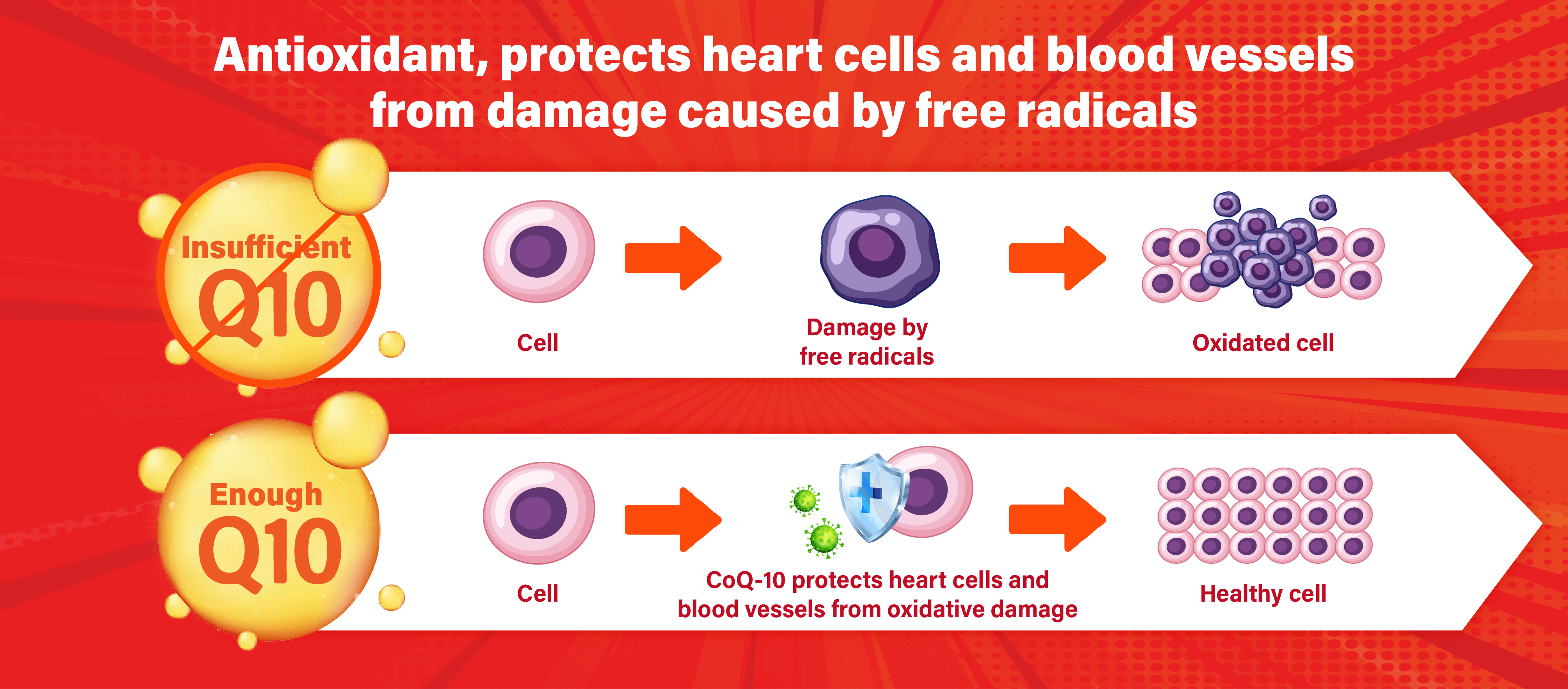 In addition to its role in energy metabolism, Q10 exhibits potent antioxidant properties, which help neutralize the damage caused by free radicals. Free radicals are unstable molecules that can cause damage to cells and tissues and are associated with various health issues including cardiovascular problems, abnormal cell growth, and aging. Q10 effectively protects heart cells and blood vessels from oxidative damage, thereby contributing to maintaining cellular health, delaying aging, and preserving normal heart muscle function. It also promotes the contraction and relaxation of the heart, making the heart stronger and providing the necessary energy for its functions.
In addition to its role in energy metabolism, Q10 exhibits potent antioxidant properties, which help neutralize the damage caused by free radicals. Free radicals are unstable molecules that can cause damage to cells and tissues and are associated with various health issues including cardiovascular problems, abnormal cell growth, and aging. Q10 effectively protects heart cells and blood vessels from oxidative damage, thereby contributing to maintaining cellular health, delaying aging, and preserving normal heart muscle function. It also promotes the contraction and relaxation of the heart, making the heart stronger and providing the necessary energy for its functions.
Q10 and Heart Health are Closely Linked
A healthy adult’s heart beats approximately 36 million times per year to meet the demands of daily activities. The heart requires a significant amount of energy to pump blood throughout the body, ensuring the normal functioning of various body parts. Research has shown that as individuals age, their body’s ability to produce Q10 declines. The concentration of Q10 in the heart decreases gradually with age, starting at 100% at the age of 20, decreasing to 68.2% at 40 years old, and further dropping to only 42.9% at 80 years old. This decline in Q10 levels can lead to decreased energy and may contribute to fatigue and cardiovascular issues.
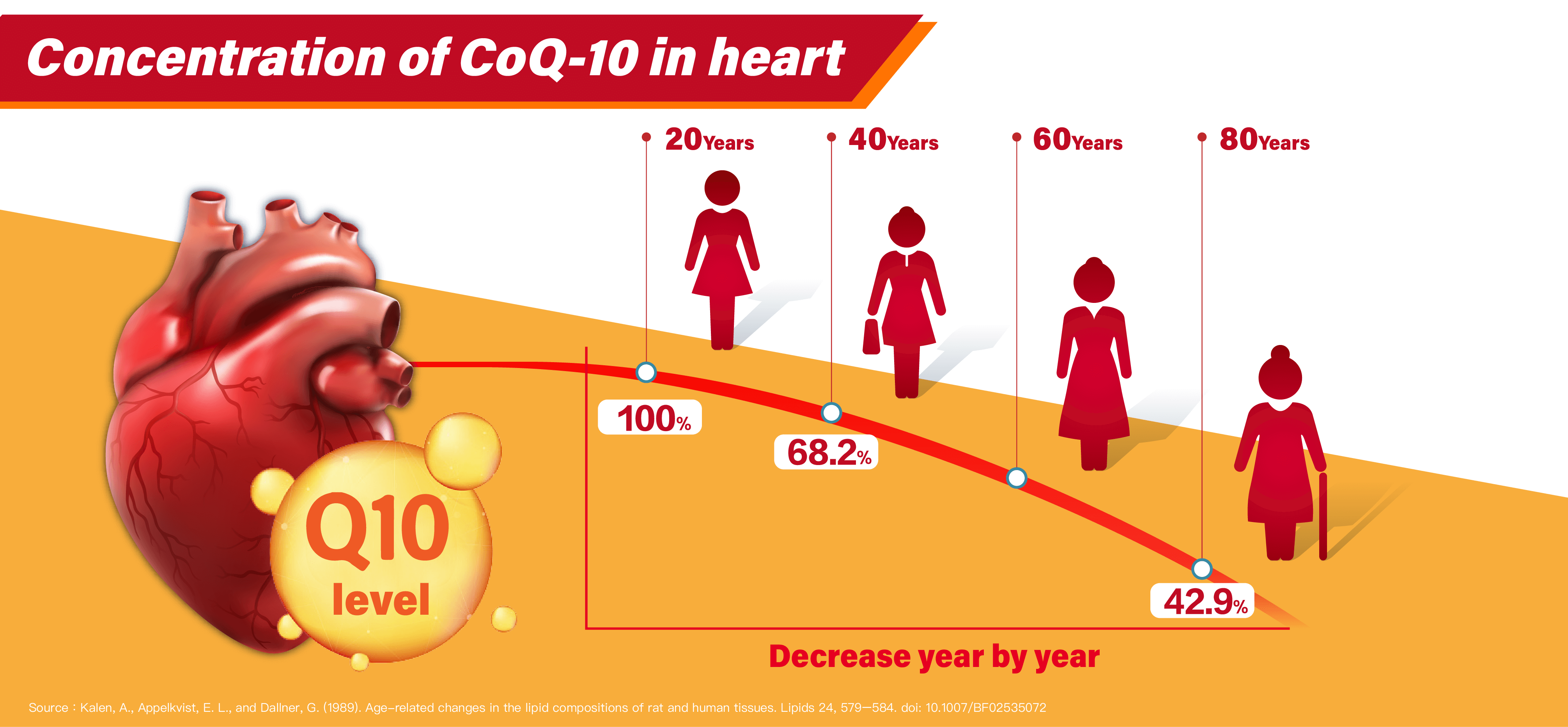 While Q10 is present in many foods, it is a fat-soluble nutrient found in foods with higher fat content such as red meats (e.g., pork, beef, lamb), fish, and nuts. However, relying solely on dietary sources may not provide sufficient Q10 intake, as it can be challenging to consume enough Q10 through regular diet alone. To easily supplement Q10, consider taking nutritional supplements.
While Q10 is present in many foods, it is a fat-soluble nutrient found in foods with higher fat content such as red meats (e.g., pork, beef, lamb), fish, and nuts. However, relying solely on dietary sources may not provide sufficient Q10 intake, as it can be challenging to consume enough Q10 through regular diet alone. To easily supplement Q10, consider taking nutritional supplements.
Q10, more beneficial when taken in higher doses? Pay attention to dosage and method of consumption.
If you want to effectively supplement Q10 and maintain heart function and antioxidation, how much should you take exactly? When choosing Q10 supplements, opt for those with natural ingredients. According to research findings, an adult typically needs to supplement with 100mg to 200mg of Q10 to achieve clinical effectiveness.
GNC offers a variety of options in its Q10 product line, providing sufficient Q10 for different needs to maintain bodily functions and achieve various health benefits.
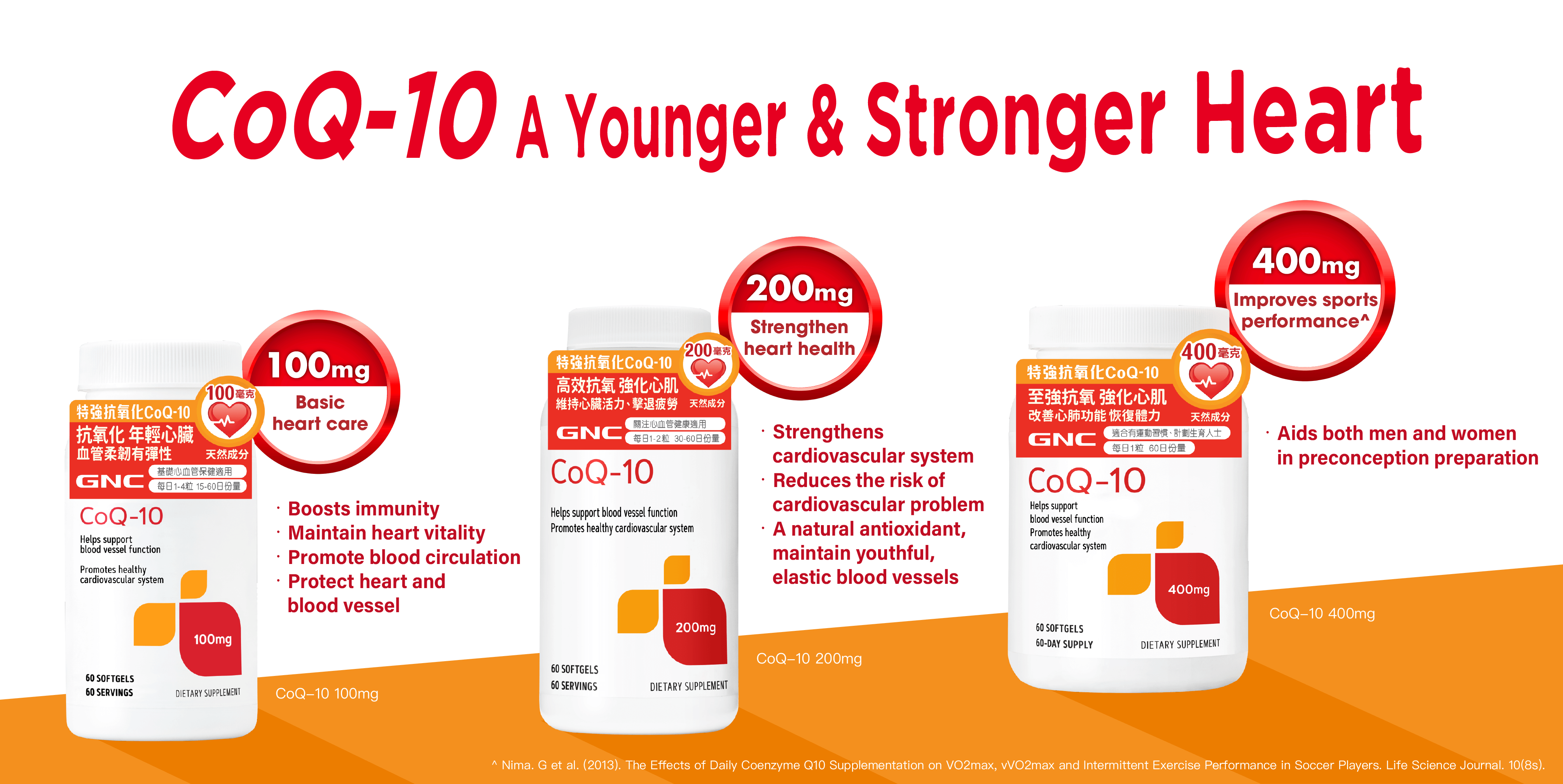 1) 100mg: Maintain heart vitality and immunity –CoQ-10 100mg
1) 100mg: Maintain heart vitality and immunity –CoQ-10 100mg
To effectively maintain heart vitality, strengthen cardiac function, and promote blood circulation, supplement with 1-4 tablets of Super Antioxidant CoQ-10 daily, ensuring that the body maintains a healthy Q10 level.
2) 200mg: Target stress and fatigue, enhance antioxidative capacity – CoQ-10 200mg
For those seeking doubled efficacy, CoQ-10 200mg is a good choice. For individuals experiencing high work stress or excessive alcohol and tobacco consumption, take 1-2 tablets daily to help strengthen cardiac muscles, promote energy synthesis, combat fatigue, and maintain vitality.
3) 400mg: Ultimate heart protection, enhance athletic performance, preconception preparation – CoQ-10 400mg
High-dose CoQ-10 aids both men and women in preconception preparation, enhancing immunity while providing natural antioxidation. It protects the heart and blood vessels from free radical damage, maintaining youthful and flexible blood vessels.
*Reference Link :
https://www.nature.com/articles/s41598-021-04708-4
https://www.chp.gov.hk/tc/healthtopics/content/25/57.html
https://www.ncbi.nlm.nih.gov/pmc/articles/PMC6627360/
Kalen, A., Appelkvist, E. L., and Dallner, G. (1989). Age-related changes in the lipid compositions of rat and human tissues. Lipids 24, 579–584. doi: 10.1007/BF02535072







